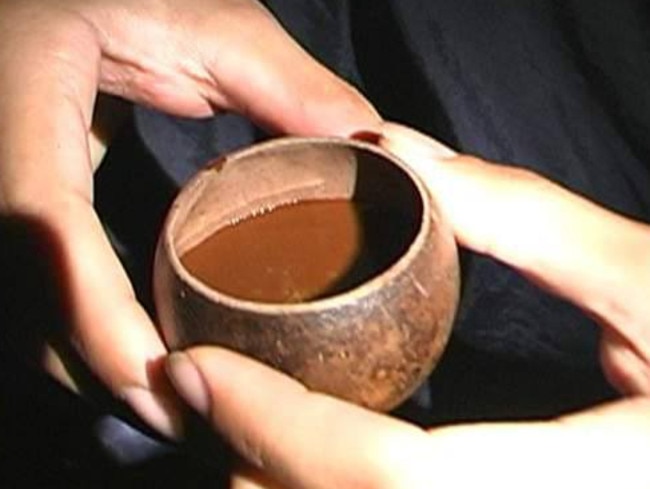Inmates are being given a powerful psychedelic in an effort to expand their moral consciousness
IT’S a radical plan, and it’s annoyed a lot of people. Violent offenders are being taken into the wilderness to drink tea ... and it might actually be working.

HARDENED inmates in a Brazilian prison who have been convicted of murder and rape are being given powerful psychedelic drugs in an effort to spiritually rehabilitate them.
The program is intended to reduce recidivism by expanding the moral consciousness of the inmates, and offers a truly novel approach to the correctional component of incarceration.
The prisoners take part in ceremonies conducted in the Amazon jungle, along with non-inmates. It may sound ill-advised to give a group of convicted criminals mind-altering psychedelics while in the world’s biggest jungle in the dead of night, but the idea comes as a much needed alternative to the traditional processes of incarceration.
Brazil’s prison system is overflowing with inmates and is producing jails notorious for human rights violations and extreme violence. Authorities are hoping this spiritual practice could help inmates repent and atone for their heinous crimes.

According to The New York Times, a prisoner’s rights group called Acuda has been offering therapeutic sessions to inmates involving yoga and meditation. After witnessing the success of these programs, they had a new idea: Why not give the inmates Ayahuasca as well?
The mixture, commonly referred to as a medicine or a tea, has powerful psychoactive properties, most notably dimethyltryptamine or DMT and many users report having intense, introspective experiences.
The substance is made by brewing two plants together and while it has been used in the Amazon for hundreds of years, the popularity of the mixture has been increasing steadily in western countries such as the United States and Australia.
The ceremony around the drinking of the tea is very ritualistic. The inmates gather in a temple, all dressed in white, as a shaman who leads the ceremony begins passing out cups of the powerful brew.
The mixture can prove incapacitating and causes many to vomit. After ingesting the Ayahuasca the inmates say they embark on an intense journey of the self, all the while accompanied by the singing of hymns. As they return to their normal state, the prisoners and other participants gather and dance together in the temple. Despite the radical nature of the approach, it is having the desired effect for many of the inmates.
“I’m finally realising I was on the wrong path in this life,” said Celmiro de Almeida, 36, who is serving a sentence for homicide. “Each experience helps me communicate with my victim to beg for forgiveness,” he told The New York Times.
Darci Altair Santos da Silva, a 43-year-old construction worker serving a 13 year sentence for the sexual abuse of a 14-year-old, said the Ayahuasca brew has helped him to reconcile his past actions.
“I know what I did was very cruel. The tea helped me reflect on this fact, on the possibility that one day I can find redemption,” he said.
Ayahuasca ceremony used in quest for ways to ease pressure on Brazil’s prison system http://t.co/s91pYpJkg1 pic.twitter.com/rnZYcd9gAC
— People First Radio (@peoplefirstrad) March 28, 2015Unsurprisingly, the radical idea has its opponents with some questioning the rehabilitative effectiveness of the program and others believing it is simply unjust.
The father of an 18-year-old girl who was raped and murdered in the area called the rehabilitation method, “utterly revolting.”
After hearing one of the men responsible for his daughter’s attack was to be taken into Acuda’s program, he was dismayed.
“My daughter’s dreams were extinguished by that man, but he will be allowed to go into the jungle and drink his tea,” he told The Times.
In addition to the ethical difficulties involved with the alternative therapy, there are of course, health risks. The drug should not be consumed by people who have recently taken narcotics such as methamphetamine or cocaine, or those using antidepressants — doing so could result in serious mental injury. Nor should it be taken by people who are susceptible to mental health issues such as schizophrenia.
However, under controlled circumstances the brew can provide something akin to a psychological cleanse for some users.
According to Dr. Charles S. Grob, a professor of psychiatry at the U.C.L.A. School of Medicine who has conducted extensive studies on Ayahuasca, the plant mixture “has great potential because under optimal conditions, it can produce a transformative experience in a person.”

The program in Brazil arose out of a need to reform a prison system that was proving unsustainable and, at times, counter-productive.
This is a sentiment that has been expressed with greater frequency in the US and was highlighted by the recent interview of The Wire creator, David Simon with President Obama about the state of the US prison system and the war on drugs.
In Australia, there has been a growing debate about the effectiveness of the rehabilitive experience produced in our prisons as many facilities around the country are becoming overcrowded. This was highlighted when a group of South Australian inmates wrote a letter to a parliamentary committee, saying many abused the system and planned to return to a life of crime upon release.
Policy makers will undoubtedly look to address these problems with more conventional methods than those adopted by the Brazilian program. But meanwhile, the popularity of Ayahuasca has exploded in Australia as many Aussies travel to South America to try the plant. Esoteric ceremonies have begun to pop up across the country as advocates conduct their own drinking rituals.
Giving hallucinogens to prisoners to expand their moral consciousness is politically and intellectually untenable in many countries, but even those who vehemently oppose the idea will be keeping a close eye on the outcome.



